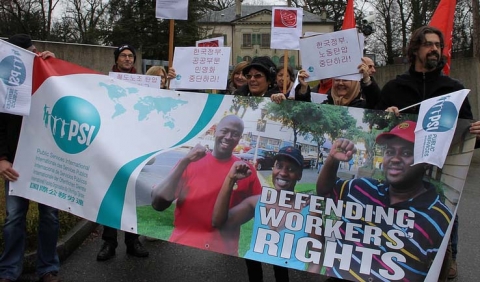As Korean workers fight for their rights, Swiss do business with Korean President

On Monday 20 January, President Park Geun-hye will join Swiss business leaders in Bern for high-level meetings. The President of the Swiss Confederation will hold official talks with the Korean President and business leaders expect to cement their already fruitful relationship with Seoul. (In 2011, Swiss exports reached CHF 2.8 billion, an increase of 3.8 %.)
What Swiss business leaders do not talk about is the fact that in South Korea, workers have been struggling for the most basic of their rights for many years.
On 22 December 2013, hundreds of Korean police violently invaded the headquarters of the Korean Confederation of Trade Unions (KCTU), apparently seeking to arrest union leaders who just concluded a legal strike against the government’s plans to privatise the railways. The president, first vice president, general secretary and president of the Seoul division of the Korean Railway Workers' Union have been imprisoned. The public rail company has dismissed 500 union activists and is suing the union for the equivalent of €10 million in damages.
The extreme violence used in that attack is just one more in a series of repressive measures used against workers and trade unions. Korean trade unions are mobilising for a day of action on Saturday 18 January 2014. International trade union solidarity will continue to bring messages of concern to Switzerland and to wherever the Korean government and Korean corporations seek to gain contracts.
President of the International Transport Workers' Federation, Paddy Crumlin, says "Korean society has mobilised against the reckless privatisation of its railways and the attacks on its trade union movement. The responsibility for those attacks lies with the Korean government and its president, whose presence in Switzerland is rightly being challenged. President Park has to understand that she and her government's actions are resonating internationally. They are bringing her country into disrepute and will continue to do so until she drops this self created and pointless confrontation."
Korea has also reportedly been connected with the brutal crackdown on striking garment workers in Cambodia on 2-3 January 2014 that ended in five deaths and many people injured. The Korea NGO Network reports that the Korean embassy and Korean companies in Cambodia asked for intervention in order to protect their interests. On 2 January, the military intervened and 15 people were arrested in front of the Korean company Yakjin. The Korean NGO Network reports that the following day, Cambodian military fired live rounds, claiming five lives.
Ambet Yuson, General Secretary of the Building and Wood Workers’ International and Chair of the Council of Global Unions, says “Since she became President, Park Geun-hye has consistently repressed the rights of trade unions in South Korea as evident by her government’s failure to recognize the Korean Government Employee Unions and decertification of the Korean Teachers and Education Workers Union. We strongly urge her to stop its aggressive tactics and engage in a constructive manner to ensure the rights of all workers in South Korea.”
Rosa Pavanelli, General Secretary of the global union federation Public Services International, says: “The recent violent attack by government forces against the Korean Confederation of Trade Unions is reprehensible. Union activists and leaders are courageously putting their careers, their health and safety on the line to defend labour rights and to fight for quality public services for all Koreans.”
Swiss corporations, the Swiss government and the rest of the world need to be aware of the systematic violation of labour rights that characterises the Korean economy. Many Korean corporations have a very bad reputation in terms of how they treat their workers.
Swiss officials must also look at the whole picture. Swiss authorities should not allow the violation of international labour standards in the pursuit of business interests.

